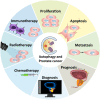Targeting autophagy in prostate cancer: preclinical and clinical evidence for therapeutic response
- PMID: 35317831
- PMCID: PMC8939209
- DOI: 10.1186/s13046-022-02293-6
Targeting autophagy in prostate cancer: preclinical and clinical evidence for therapeutic response
Abstract
Prostate cancer is a leading cause of death worldwide and new estimates revealed prostate cancer as the leading cause of death in men in 2021. Therefore, new strategies are pertinent in the treatment of this malignant disease. Macroautophagy/autophagy is a "self-degradation" mechanism capable of facilitating the turnover of long-lived and toxic macromolecules and organelles. Recently, attention has been drawn towards the role of autophagy in cancer and how its modulation provides effective cancer therapy. In the present review, we provide a mechanistic discussion of autophagy in prostate cancer. Autophagy can promote/inhibit proliferation and survival of prostate cancer cells. Besides, metastasis of prostate cancer cells is affected (via induction and inhibition) by autophagy. Autophagy can affect the response of prostate cancer cells to therapy such as chemotherapy and radiotherapy, given the close association between autophagy and apoptosis. Increasing evidence has demonstrated that upstream mediators such as AMPK, non-coding RNAs, KLF5, MTOR and others regulate autophagy in prostate cancer. Anti-tumor compounds, for instance phytochemicals, dually inhibit or induce autophagy in prostate cancer therapy. For improving prostate cancer therapy, nanotherapeutics such as chitosan nanoparticles have been developed. With respect to the context-dependent role of autophagy in prostate cancer, genetic tools such as siRNA and CRISPR-Cas9 can be utilized for targeting autophagic genes. Finally, these findings can be translated into preclinical and clinical studies to improve survival and prognosis of prostate cancer patients.
Keywords: Anti-tumor compounds; Autophagy; Biomarker; Non-coding RNAs; Prostate cancer; Therapy response.
© 2022. The Author(s).
Conflict of interest statement
The authors declare no conflict of interest.
Figures









References
-
- Swami U, et al. Advanced prostate cancer: treatment advances and future directions. Trends Cancer. 2020;6(8):702–715. - PubMed
-
- Siegel RL, Miller KD, Jemal A. Cancer statistics, 2016. CA Cancer J Clin. 2016;66(1):7–30. - PubMed
-
- Sung H, et al. Global cancer statistics 2020: GLOBOCAN estimates of incidence and mortality worldwide for 36 cancers in 185 countries. CA Cancer J Clin. 2021;71(3):209–249. - PubMed
Publication types
MeSH terms
Grants and funding
LinkOut - more resources
Full Text Sources
Medical
Miscellaneous

